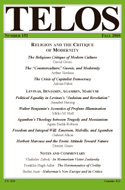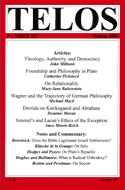By Telos Press · Tuesday, November 16, 2010 From Telos 152 (Fall 2010), Mirko M. Hall’s “Dialectical Sonority: Walter Benjamin’s Acoustics of Profane Illumination.” Read the full version at TELOS Online website.
Abstract
 Given the extensive scholarship on Walter Benjamin, there exists a real scarcity of theoretical engagement with his views on acoustic phenomena. Yet throughout his critical writings, Benjamin displays a keen sensitivity to sound. In fact, he develops a concept of sound, which is equivalent—in its epistemological and metaphysical presuppositions—to the constitutive properties of the dialectical image: the aural thunderclap of sound parallels the visual lightning flash of the image. Given the extensive scholarship on Walter Benjamin, there exists a real scarcity of theoretical engagement with his views on acoustic phenomena. Yet throughout his critical writings, Benjamin displays a keen sensitivity to sound. In fact, he develops a concept of sound, which is equivalent—in its epistemological and metaphysical presuppositions—to the constitutive properties of the dialectical image: the aural thunderclap of sound parallels the visual lightning flash of the image.
Continue reading →
By Jennifer Wang · Tuesday, November 9, 2010 On Tuesdays at the TELOSscope blog, we highlight a past Telos article whose critical insights continue to illuminate our thinking and challenge our assumptions. Today, Jennifer Wang looks at John Hughes and Matthew Bullimore’s “What is Radical Orthodoxy?” from Telos 123 (Spring 2002).
 In “What is Radical Orthodoxy?” John Hughes and Matthew Bullimore provide a fascinating overview of Radical Orthodoxy’s intervention into a philosophical and theological climate that they considered stale. Rooted in the Cambridge theological tradition, this project also draws on thinkers like Nietzsche, Deleuze, and Alasdair MacIntyre in order to critique the violence of secular social theories. Currently, its three main figures are John Milbank, Catherine Pickstock, and Graham Ward, who, in 1999, along with various supporters, issued a manifesto “proclaiming the bankruptcy of the secular and the urgent necessity to return to the theological afresh.” For them, the theological is able to account for the secular as a heretical deviation from orthodox Christianity (as found in the writings of the Church Fathers and Doctors like Augustine and Thomas Aquinas), which alone is truly radical. This paradoxical position has attracted criticism from theologians both liberal and conservative, as well as from opposing camps on issues in philosophy and politics. Hughes and Bullimore, however, think that they are not striking a middling compromise: In “What is Radical Orthodoxy?” John Hughes and Matthew Bullimore provide a fascinating overview of Radical Orthodoxy’s intervention into a philosophical and theological climate that they considered stale. Rooted in the Cambridge theological tradition, this project also draws on thinkers like Nietzsche, Deleuze, and Alasdair MacIntyre in order to critique the violence of secular social theories. Currently, its three main figures are John Milbank, Catherine Pickstock, and Graham Ward, who, in 1999, along with various supporters, issued a manifesto “proclaiming the bankruptcy of the secular and the urgent necessity to return to the theological afresh.” For them, the theological is able to account for the secular as a heretical deviation from orthodox Christianity (as found in the writings of the Church Fathers and Doctors like Augustine and Thomas Aquinas), which alone is truly radical. This paradoxical position has attracted criticism from theologians both liberal and conservative, as well as from opposing camps on issues in philosophy and politics. Hughes and Bullimore, however, think that they are not striking a middling compromise:
Continue reading →
By Telos Press · Monday, November 8, 2010 From Telos 152 (Fall 2010), Annabel Herzog’s “Political Equality in Levinas’s ‘Judaism and Revolution’.” Read the full version at TELOS Online website.
Abstract
 This article is an interpretation of Levinas’s Talmudic reading “Judaism and Revolution” (1969), whose philosophical aim was to propose a critical answer to Marxist revolutionary materialism. The paper argues that, in that reading, Levinas uses the Talmud to exemplify the confrontation between the question of equality (namely, politics) and that of absolute and non-egalitarian responsibility (namely, ethics). Levinas’s essay follows the order of the Talmud page Baba Metsi’a 83a-b, which starts in enunciating rules about employer-worker relationships, and ends with a discussion about the collaboration of Jews with the Roman political power. In other words, it starts with a question about labor laws and workers’ rights and becomes a political and a theological problem—the problem of the irreducibility of evil. This article shows how Levinas connects these two apparently unrelated questions and uses the Talmudic text as an illustration of his own philosophy. This article is an interpretation of Levinas’s Talmudic reading “Judaism and Revolution” (1969), whose philosophical aim was to propose a critical answer to Marxist revolutionary materialism. The paper argues that, in that reading, Levinas uses the Talmud to exemplify the confrontation between the question of equality (namely, politics) and that of absolute and non-egalitarian responsibility (namely, ethics). Levinas’s essay follows the order of the Talmud page Baba Metsi’a 83a-b, which starts in enunciating rules about employer-worker relationships, and ends with a discussion about the collaboration of Jews with the Roman political power. In other words, it starts with a question about labor laws and workers’ rights and becomes a political and a theological problem—the problem of the irreducibility of evil. This article shows how Levinas connects these two apparently unrelated questions and uses the Talmudic text as an illustration of his own philosophy.
Continue reading →
By Telos Press · Saturday, October 30, 2010 From Telos 152 (Fall 2010), Adrian Pabst’s “The Crisis of Capitalist Democracy.” Read the full version at TELOS Online website.
Abstract
 Since the onset of Great Recession that was triggered by the credit crunch in August 2007, both academic and public debate in the West has centered on the failure of free-market capitalism and the return of democratic statehood. This essay argues that such and similar accounts of the current crisis ignore the collusion of state and market and the convergence of democracy and capitalism. The real issue is neither the capture of states by corporations nor that of corporations by states but instead the subordination of society to the centralized state and the unbridled “free market.” Closely connected to this is the triumph of capitalist democracy that reinforces the abstraction from locality, community, and association, which is common to both mass representation and commodification. Since the onset of Great Recession that was triggered by the credit crunch in August 2007, both academic and public debate in the West has centered on the failure of free-market capitalism and the return of democratic statehood. This essay argues that such and similar accounts of the current crisis ignore the collusion of state and market and the convergence of democracy and capitalism. The real issue is neither the capture of states by corporations nor that of corporations by states but instead the subordination of society to the centralized state and the unbridled “free market.” Closely connected to this is the triumph of capitalist democracy that reinforces the abstraction from locality, community, and association, which is common to both mass representation and commodification.
Continue reading →
By Telos Press · Friday, October 22, 2010 From Telos 152 (Fall 2010), Arthur Versluis’s “The ‘Counterculture,’ Gnosis, and Modernity.” Read the full version at TELOS Online website.
Abstract
 Interpretations of the 1960s counterculture vary widely but often do not include discussion of its religious origins and significances. The counterculture represented the emergence into broader society of an essentially gnostic perspective, that is, a perspective that emphasizes above all not faith in a historical narrative promising a religious or secular millennium somewhere ahead, but direct individual spiritual insight here and now, as Theodore Roszak pointed out in his seminal The Making of the Counterculture. Interpretations of the 1960s counterculture vary widely but often do not include discussion of its religious origins and significances. The counterculture represented the emergence into broader society of an essentially gnostic perspective, that is, a perspective that emphasizes above all not faith in a historical narrative promising a religious or secular millennium somewhere ahead, but direct individual spiritual insight here and now, as Theodore Roszak pointed out in his seminal The Making of the Counterculture.
Continue reading →
By Telos Press · Thursday, October 14, 2010 From Telos 152 (Fall 2010), David Gross’s “A New Direction: The Religious Critique of Modern Culture.” Read the full version at TELOS Online website.
Abstract
 In their analyses of modern life, cultural critics in the twentieth and twenty-first centuries have drawn on many strains of thought but have generally overlooked religion as a source of Kritik. This article investigates the observations and insights that can be found in certain Western religious (and, more particularly, Catholic) traditions, and then assesses their overall value or usefulness for contemporary cultural criticism. In their analyses of modern life, cultural critics in the twentieth and twenty-first centuries have drawn on many strains of thought but have generally overlooked religion as a source of Kritik. This article investigates the observations and insights that can be found in certain Western religious (and, more particularly, Catholic) traditions, and then assesses their overall value or usefulness for contemporary cultural criticism.
Continue reading →
|
|
 Given the extensive scholarship on Walter Benjamin, there exists a real scarcity of theoretical engagement with his views on acoustic phenomena. Yet throughout his critical writings, Benjamin displays a keen sensitivity to sound. In fact, he develops a concept of sound, which is equivalent—in its epistemological and metaphysical presuppositions—to the constitutive properties of the dialectical image: the aural thunderclap of sound parallels the visual lightning flash of the image.
Given the extensive scholarship on Walter Benjamin, there exists a real scarcity of theoretical engagement with his views on acoustic phenomena. Yet throughout his critical writings, Benjamin displays a keen sensitivity to sound. In fact, he develops a concept of sound, which is equivalent—in its epistemological and metaphysical presuppositions—to the constitutive properties of the dialectical image: the aural thunderclap of sound parallels the visual lightning flash of the image.  In “What is Radical Orthodoxy?” John Hughes and Matthew Bullimore provide a fascinating overview of Radical Orthodoxy’s intervention into a philosophical and theological climate that they considered stale. Rooted in the Cambridge theological tradition, this project also draws on thinkers like Nietzsche, Deleuze, and Alasdair MacIntyre in order to critique the violence of secular social theories. Currently, its three main figures are John Milbank, Catherine Pickstock, and Graham Ward, who, in 1999, along with various supporters, issued a manifesto “proclaiming the bankruptcy of the secular and the urgent necessity to return to the theological afresh.” For them, the theological is able to account for the secular as a heretical deviation from orthodox Christianity (as found in the writings of the Church Fathers and Doctors like Augustine and Thomas Aquinas), which alone is truly radical. This paradoxical position has attracted criticism from theologians both liberal and conservative, as well as from opposing camps on issues in philosophy and politics. Hughes and Bullimore, however, think that they are not striking a middling compromise:
In “What is Radical Orthodoxy?” John Hughes and Matthew Bullimore provide a fascinating overview of Radical Orthodoxy’s intervention into a philosophical and theological climate that they considered stale. Rooted in the Cambridge theological tradition, this project also draws on thinkers like Nietzsche, Deleuze, and Alasdair MacIntyre in order to critique the violence of secular social theories. Currently, its three main figures are John Milbank, Catherine Pickstock, and Graham Ward, who, in 1999, along with various supporters, issued a manifesto “proclaiming the bankruptcy of the secular and the urgent necessity to return to the theological afresh.” For them, the theological is able to account for the secular as a heretical deviation from orthodox Christianity (as found in the writings of the Church Fathers and Doctors like Augustine and Thomas Aquinas), which alone is truly radical. This paradoxical position has attracted criticism from theologians both liberal and conservative, as well as from opposing camps on issues in philosophy and politics. Hughes and Bullimore, however, think that they are not striking a middling compromise: 

